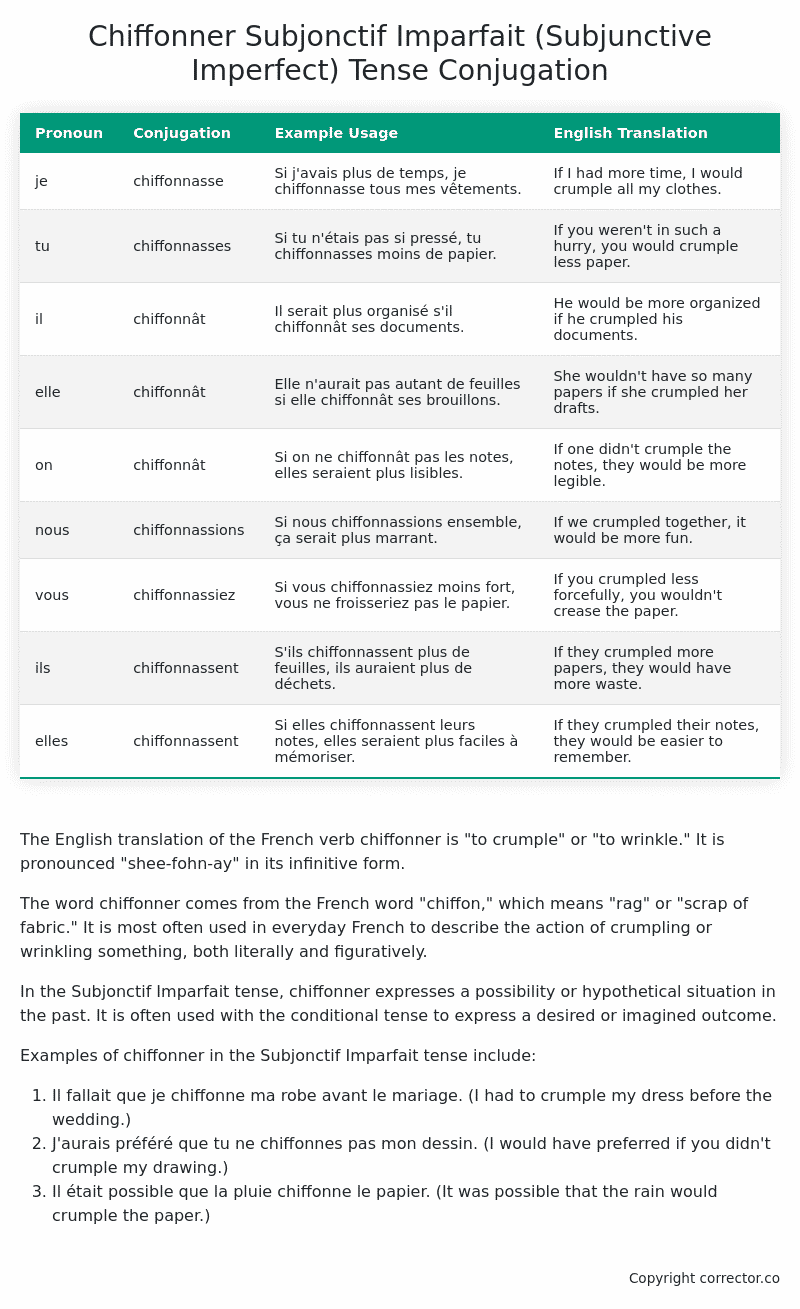Subjonctif Imparfait (Subjunctive Imperfect) Tense Conjugation of the French Verb chiffonner
Introduction to the verb chiffonner
The English translation of the French verb chiffonner is “to crumple” or “to wrinkle.” It is pronounced “shee-fohn-ay” in its infinitive form.
The word chiffonner comes from the French word “chiffon,” which means “rag” or “scrap of fabric.” It is most often used in everyday French to describe the action of crumpling or wrinkling something, both literally and figuratively.
In the Subjonctif Imparfait tense, chiffonner expresses a possibility or hypothetical situation in the past. It is often used with the conditional tense to express a desired or imagined outcome.
Examples of chiffonner in the Subjonctif Imparfait tense include:
- Il fallait que je chiffonne ma robe avant le mariage. (I had to crumple my dress before the wedding.)
- J’aurais préféré que tu ne chiffonnes pas mon dessin. (I would have preferred if you didn’t crumple my drawing.)
- Il était possible que la pluie chiffonne le papier. (It was possible that the rain would crumple the paper.)
Table of the Subjonctif Imparfait (Subjunctive Imperfect) Tense Conjugation of chiffonner
| Pronoun | Conjugation | Example Usage | English Translation |
|---|---|---|---|
| je | chiffonnasse | Si j’avais plus de temps, je chiffonnasse tous mes vêtements. | If I had more time, I would crumple all my clothes. |
| tu | chiffonnasses | Si tu n’étais pas si pressé, tu chiffonnasses moins de papier. | If you weren’t in such a hurry, you would crumple less paper. |
| il | chiffonnât | Il serait plus organisé s’il chiffonnât ses documents. | He would be more organized if he crumpled his documents. |
| elle | chiffonnât | Elle n’aurait pas autant de feuilles si elle chiffonnât ses brouillons. | She wouldn’t have so many papers if she crumpled her drafts. |
| on | chiffonnât | Si on ne chiffonnât pas les notes, elles seraient plus lisibles. | If one didn’t crumple the notes, they would be more legible. |
| nous | chiffonnassions | Si nous chiffonnassions ensemble, ça serait plus marrant. | If we crumpled together, it would be more fun. |
| vous | chiffonnassiez | Si vous chiffonnassiez moins fort, vous ne froisseriez pas le papier. | If you crumpled less forcefully, you wouldn’t crease the paper. |
| ils | chiffonnassent | S’ils chiffonnassent plus de feuilles, ils auraient plus de déchets. | If they crumpled more papers, they would have more waste. |
| elles | chiffonnassent | Si elles chiffonnassent leurs notes, elles seraient plus faciles à mémoriser. | If they crumpled their notes, they would be easier to remember. |
Other Conjugations for Chiffonner.
Le Present (Present Tense) Conjugation of the French Verb chiffonner
Imparfait (Imperfect) Tense Conjugation of the French Verb chiffonner
Passé Simple (Simple Past) Tense Conjugation of the French Verb chiffonner
Passé Composé (Present Perfect) Tense Conjugation of the French Verb chiffonner
Futur Simple (Simple Future) Tense Conjugation of the French Verb chiffonner
Futur Proche (Near Future) Tense Conjugation of the French Verb chiffonner
Plus-que-parfait (Pluperfect) Tense Conjugation of the French Verb chiffonner
Passé Antérieur (Past Anterior) Tense Conjugation of the French Verb chiffonner
Futur Antérieur (Future Anterior) Tense Conjugation of the French Verb chiffonner
Subjonctif Présent (Subjunctive Present) Tense Conjugation of the French Verb chiffonner
Subjonctif Passé (Subjunctive Past) Tense Conjugation of the French Verb chiffonner
Subjonctif Imparfait (Subjunctive Imperfect) Tense Conjugation of the French Verb chiffonner (this article)
Subjonctif Plus-que-parfait (Subjunctive Pluperfect) Tense Conjugation of the French Verb chiffonner
Conditionnel Présent (Conditional Present) Tense Conjugation of the French Verb chiffonner
Conditionnel Passé (Conditional Past) Tense Conjugation of the French Verb chiffonner
L’impératif Présent (Imperative Present) Tense Conjugation of the French Verb chiffonner
L’infinitif Présent (Infinitive Present) Tense Conjugation of the French Verb chiffonner
Struggling with French verbs or the language in general? Why not use our free French Grammar Checker – no registration required!
Get a FREE Download Study Sheet of this Conjugation 🔥
Simply right click the image below, click “save image” and get your free reference for the chiffonner Subjonctif Imparfait tense conjugation!

Chiffonner – About the French Subjonctif Imparfait (Subjunctive Imperfect) Tense
Formation
Common Everyday Usage Patterns
Interactions with Other Tenses
Subjonctif Présent
Indicatif Passé Composé
Conditional
Conditional Perfect
Summary
I hope you enjoyed this article on the verb chiffonner. Still in a learning mood? Check out another TOTALLY random French verb conjugation!


